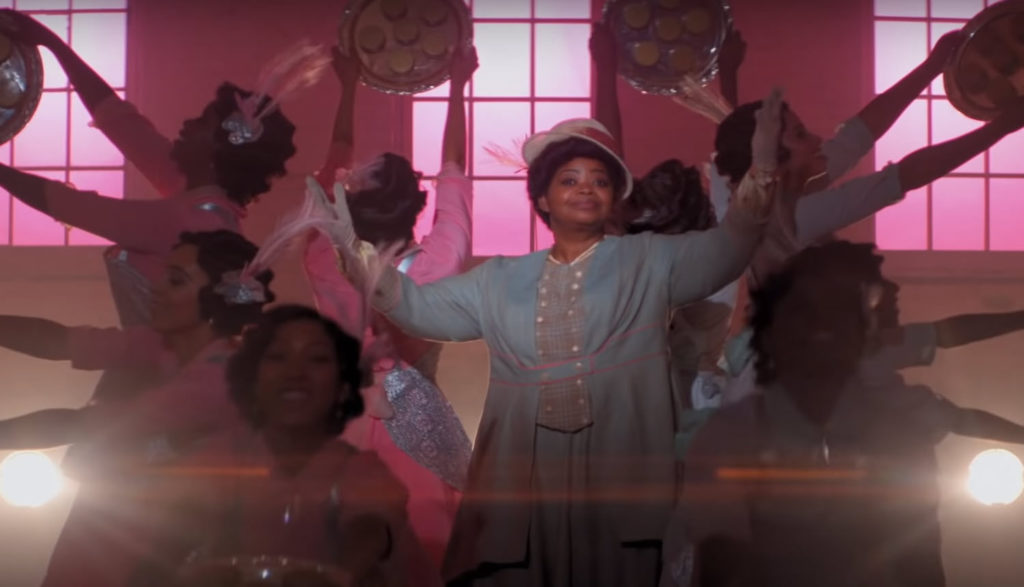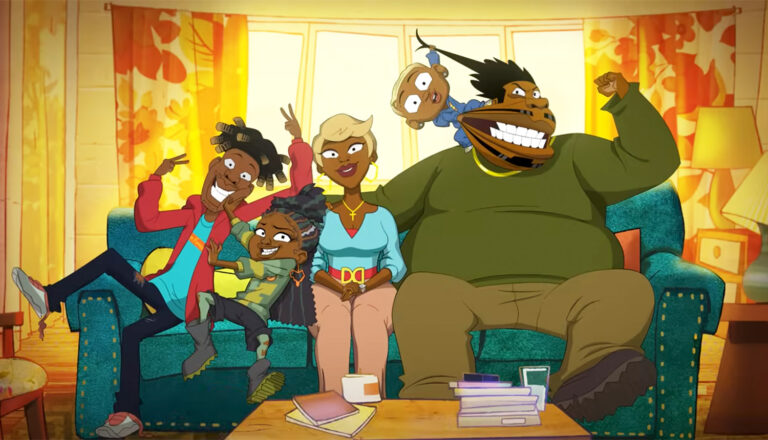
“Hair is power,” Sarah Walker tells us from the outset. And for her, it was true.
When she talked with her customers—African American women struggling through the early part of the 20th century—she told them that their hair was the key to a better life: Better jobs. More opportunities. And especially, more confidence.
She was once just like them, Walker says: overworked, overlooked. No, worse. Born just two years after the Civil War ended, she worked in the fields from the time she was a toddler. She was “married at 14, pregnant at 15, a widow by 20.” Her second husband was often drunk and constantly abusivebefore he, too, died. She worked her fingers raw as a washerwoman. All the stress and work did terrible things to her hair—to the point where much of it had fallen out.
But then, when she used something that helped it grow back—and to grow more luxuriant, more pliant—everything changed.
Now, she tells her rapt audience, she’s developed a new array of hair-care products designed especially for them. And she promises that using those products will change their lives, too.
And so her customers snap up shampoos, tonics, and miracle hair products of all kinds. They file into her salon by the dozens. And even as her third husband, C.J., struggles to find his place in “their” business, and as Sarah’s daughter, Lelia, is groomed to take over, Sarah counts her money. She starts another factory. She spreads her wealth to causes she deems worthy.
Yes, hair is power: Madam C.J. Walker knows that her clients’ hair has powered her success—to the point where she becomes the first female self-made millionaire in the United States.
Not that she didn’t struggle to get there. Netflix’s creative take on Sarah Walker’s real-life story is filled with plenty of tangles on the way to the bank.
Take Addie, Sarah’s mentor-turned-hair-care-rival. Originally, Sarah wanted to hock Addie’s products, not her own: They were, after all, responsible for Sarah’s own resurgent comb-worthy confidence. But light-skinned Addie practically laughs in Sarah’s face when Sarah suggests it. Sarah’s look, Addie says (as she stares down her nose) is all wrong. “Colored
women will do anything to look like me, even though deep down they know they can’t,” she says.
And things at home rarely go smoothly, either. Sarah’s husband, C.J., feels increasingly marginalized by his wife’s success, and he begins sleeping around. Her daughter, too, strays from Sarah’s wishes and ambitions, even though she seems to have a strong business acumen of her own.
And then there’s simply the age in which they all live—an age in which it’s hard enough to start a business, much less as a black woman.
Self Made claims to be “inspired” by Madam C.J. Walker’s story—not based on it. And while the Netflix miniseries seems to adhere to the general outline of Madam Walker’s history, it deviates significantly in the details.
It’s rated TV-MA, too. And while the opening volleys of this four-part miniseries didn’t warrant that heavy rating, we can see how things might get worse in the episodes to follow. Out-of-wedlock relationships—including between same-sex couples, will most certainly be part of the plot. Viewers are liable to hear a smattering of profanities, too. And while Sarah seems deeply religious, she’s also not above using that religion as another lever to earn a few more worldly treasures.
Still, Sarah’s story is inherently compelling and, in many respects, inspiring. It insists that success is indeed achievable, but dreaming about it isn’t enough. It takes vision, sacrifice and a ton of hard work to make it happen. And that’s a good reminder for us all.
Sarah asks for the opportunity to become a St. Louis saleswomen—selling “Addie’s Hair Grower.”–Addie turns her down because of her looks. The two have a falling out shortly thereafter, and Sarah moves from St. Louis to Indianapolis, determined to start her own line of hair-care products.
In a flashback, we see Sarah fight with her second husband (who later died, we’re told): The drunken man smashes a bottle of liquor on a table and cuts Sarah’s arm pretty badly. Later, Sarah cuts herself again—this time by punching a mirror. Something inside a house explodes, catching the building on fire. In imaginative sequences, Sarah and Addie—positioned as boxers—dance about in a boxing ring. A dead rat lies on a living room floor.
Sarah mentions God and her Christian faith frequently. “I used to wonder, ‘if God don’t like ugly, why did He make me?’” she muses. We hear about heavenly rewards and taking on demons, and both Sarah and Addie use a worship service as a way of marketing their products.
Sarah says that she was married at 14 and pregnant at 15. She tells her daughter, Lelia, that she’s not “cute or clever enough to survive getting knocked up by some do-nothing musician,” but Lelia doesn’t listen. She marries that musician, and Sarah worries the relationship might lead to Lelia eventually landing into prostitution. We hear some references to rape, as well. Sarah’s father-in-law warns his son, C.J., that it’s not good for him to be working for his wife. “Never get your money where you get your honey,” he says. We see some racism at play and hear about violent, racial unrest. There’s a reference to gambling.


Paul Asay has been part of the Plugged In staff since 2007, watching and reviewing roughly 15 quintillion movies and television shows. He’s written for a number of other publications, too, including Time, The Washington Post and Christianity Today. The author of several books, Paul loves to find spirituality in unexpected places, including popular entertainment, and he loves all things superhero. His vices include James Bond films, Mountain Dew and terrible B-grade movies. He’s married, has two children and a neurotic dog, runs marathons on occasion and hopes to someday own his own tuxedo. Feel free to follow him on Twitter @AsayPaul.

An elf mage contemplates on connection and regret as she watches her human friends grow old and pass away.

Netflix takes a classic sitcom, Good Times, and turns it into a vulgar, violent, sexually-charged TV-MA show.